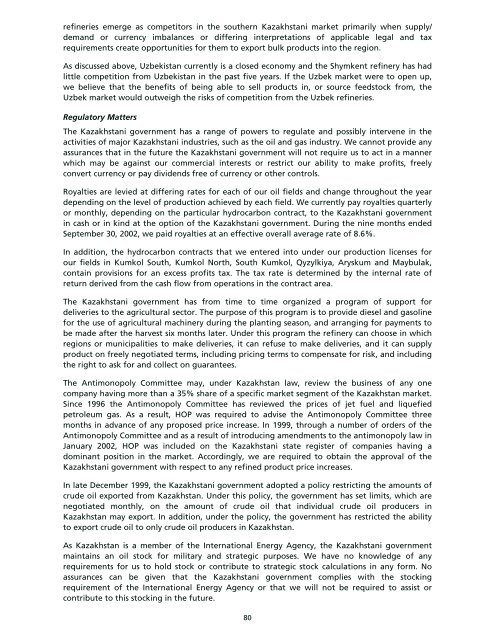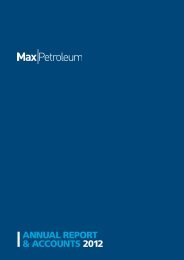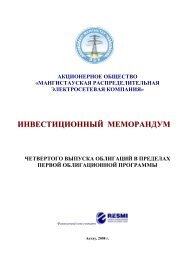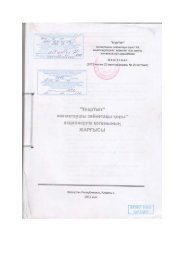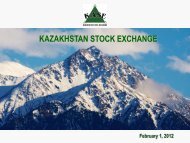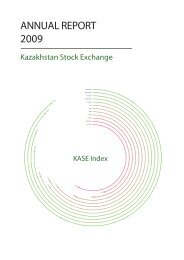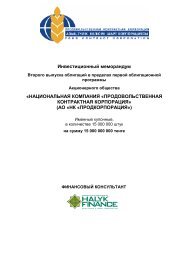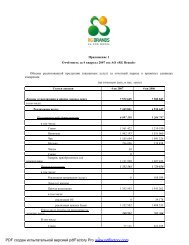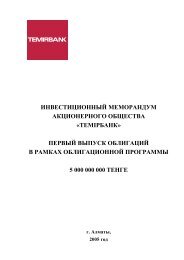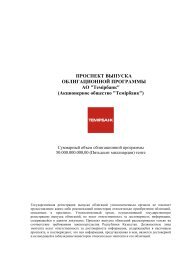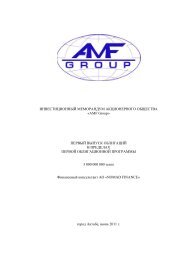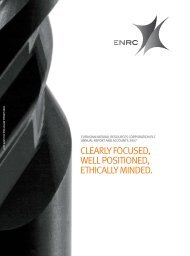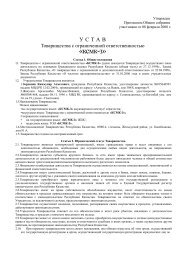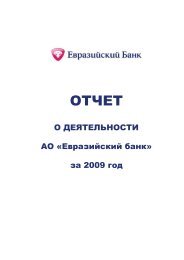JPMorgan - KASE
JPMorgan - KASE
JPMorgan - KASE
Create successful ePaper yourself
Turn your PDF publications into a flip-book with our unique Google optimized e-Paper software.
efineries emerge as competitors in the southern Kazakhstani market primarily when supply/<br />
demand or currency imbalances or differing interpretations of applicable legal and tax<br />
requirements create opportunities for them to export bulk products into the region.<br />
As discussed above, Uzbekistan currently is a closed economy and the Shymkent refinery has had<br />
little competition from Uzbekistan in the past five years. If the Uzbek market were to open up,<br />
we believe that the benefits of being able to sell products in, or source feedstock from, the<br />
Uzbek market would outweigh the risks of competition from the Uzbek refineries.<br />
Regulatory Matters<br />
The Kazakhstani government has a range of powers to regulate and possibly intervene in the<br />
activities of major Kazakhstani industries, such as the oil and gas industry. We cannot provide any<br />
assurances that in the future the Kazakhstani government will not require us to act in a manner<br />
which may be against our commercial interests or restrict our ability to make profits, freely<br />
convert currency or pay dividends free of currency or other controls.<br />
Royalties are levied at differing rates for each of our oil fields and change throughout the year<br />
depending on the level of production achieved by each field. We currently pay royalties quarterly<br />
or monthly, depending on the particular hydrocarbon contract, to the Kazakhstani government<br />
in cash or in kind at the option of the Kazakhstani government. During the nine months ended<br />
September 30, 2002, we paid royalties at an effective overall average rate of 8.6%.<br />
In addition, the hydrocarbon contracts that we entered into under our production licenses for<br />
our fields in Kumkol South, Kumkol North, South Kumkol, Qyzylkiya, Aryskum and Maybulak,<br />
contain provisions for an excess profits tax. The tax rate is determined by the internal rate of<br />
return derived from the cash flow from operations in the contract area.<br />
The Kazakhstani government has from time to time organized a program of support for<br />
deliveries to the agricultural sector. The purpose of this program is to provide diesel and gasoline<br />
for the use of agricultural machinery during the planting season, and arranging for payments to<br />
be made after the harvest six months later. Under this program the refinery can choose in which<br />
regions or municipalities to make deliveries, it can refuse to make deliveries, and it can supply<br />
product on freely negotiated terms, including pricing terms to compensate for risk, and including<br />
the right to ask for and collect on guarantees.<br />
The Antimonopoly Committee may, under Kazakhstan law, review the business of any one<br />
company having more than a 35% share of a specific market segment of the Kazakhstan market.<br />
Since 1996 the Antimonopoly Committee has reviewed the prices of jet fuel and liquefied<br />
petroleum gas. As a result, HOP was required to advise the Antimonopoly Committee three<br />
months in advance of any proposed price increase. In 1999, through a number of orders of the<br />
Antimonopoly Committee and as a result of introducing amendments to the antimonopoly law in<br />
January 2002, HOP was included on the Kazakhstani state register of companies having a<br />
dominant position in the market. Accordingly, we are required to obtain the approval of the<br />
Kazakhstani government with respect to any refined product price increases.<br />
In late December 1999, the Kazakhstani government adopted a policy restricting the amounts of<br />
crude oil exported from Kazakhstan. Under this policy, the government has set limits, which are<br />
negotiated monthly, on the amount of crude oil that individual crude oil producers in<br />
Kazakhstan may export. In addition, under the policy, the government has restricted the ability<br />
to export crude oil to only crude oil producers in Kazakhstan.<br />
As Kazakhstan is a member of the International Energy Agency, the Kazakhstani government<br />
maintains an oil stock for military and strategic purposes. We have no knowledge of any<br />
requirements for us to hold stock or contribute to strategic stock calculations in any form. No<br />
assurances can be given that the Kazakhstani government complies with the stocking<br />
requirement of the International Energy Agency or that we will not be required to assist or<br />
contribute to this stocking in the future.<br />
80


